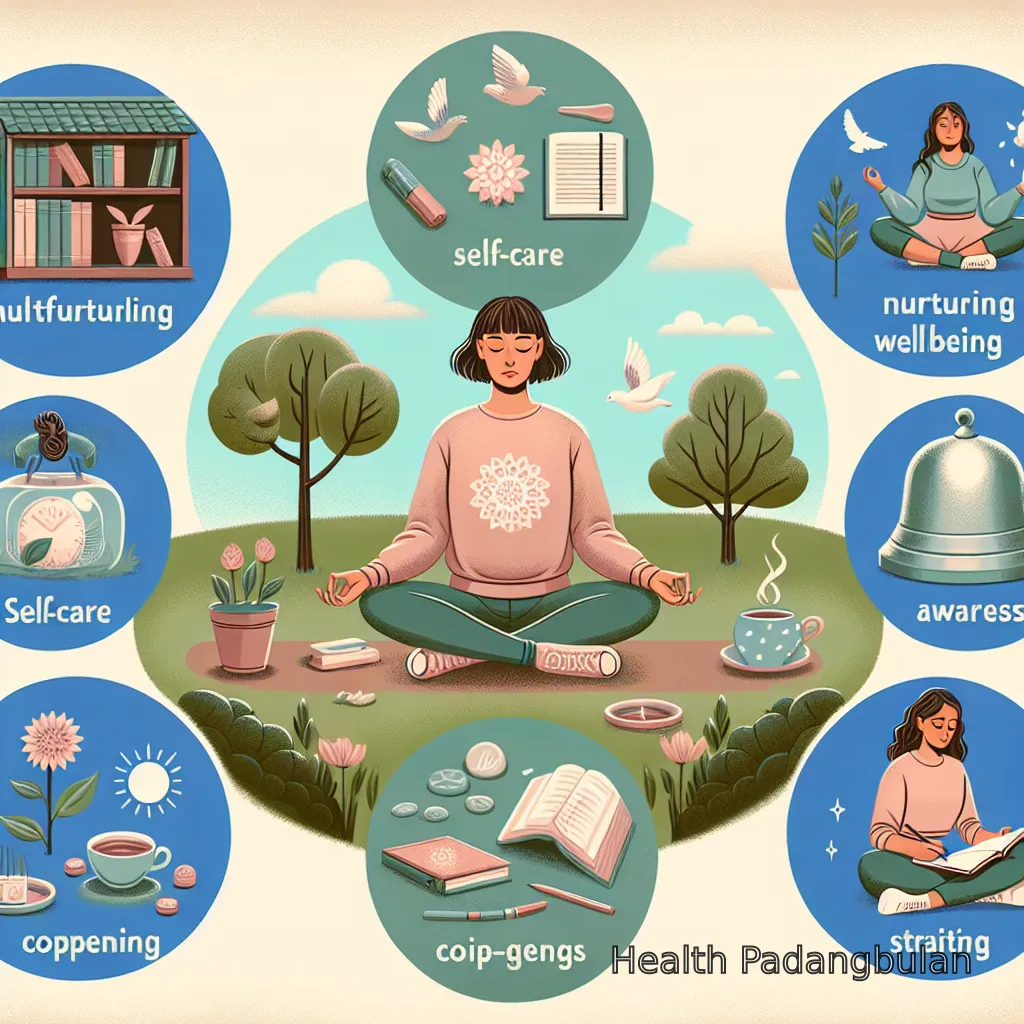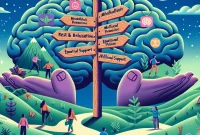Ever tried to explain something really big and complex, only to find yourself fumbling for the right words? That’s often the case with mental health. It’s more than just a buzzword; it’s a cornerstone of who we are, how we think, feel, and act every single day. But ask a handful of people, “What is mental health?” and you might get a handful of different answers. Some might say it’s about not having a mental illness, while others might focus on happiness or resilience. The truth is, it’s all that and so much more. Think of your mental health as the operating system for your entire life – it influences everything from your relationships and work performance to your physical health and overall enjoyment of life. It’s not a static state, but a dynamic, ever-changing landscape of our inner world. Let’s peel back the layers and truly understand this vital aspect of our existence.
Beyond the Absence of Illness: A Holistic View of Mental Health

When we talk about physical health, most of us understand it’s not just about not being sick. It’s about being fit, eating well, having energy, and living vibrantly. Well, the same goes for our mental health. It’s not merely the absence of a mental illness or disorder. Instead, the World Health Organization (WHO) defines mental health as “a state of well-being in which an individual realizes his or her own abilities, can cope with the normal stresses of life, can work productively and fruitfully, and is able to make a contribution to his or her community.”
See? It’s about so much more than just avoiding the bad stuff. It encompasses our emotional, psychological, and social well-being. It’s about how you handle stress, relate to others, and make choices. It’s your inner strength, your ability to bounce back, and your capacity to find joy and meaning, even when life throws a curveball. Imagine your mind as a garden. Just like a garden needs sunlight, water, and rich soil to flourish, your mental health needs consistent care, self-awareness, and nurturing environments to thrive. It’s a continuous process of growth and adaptation, not a destination.
Read also : Mental Health Awareness
The Pillars of Your Inner World: Components of Mental Well-being
To truly grasp what is mental health, it helps to break it down into its core components. These ‘pillars’ work together to support your overall state of mind:
- **Emotional Well-being:** This is about your ability to understand, express, and manage your emotions. It includes experiencing a range of emotions appropriately, having a positive outlook, and feeling content or happy with your life.
- **Psychological Well-being:** This refers to your cognitive functions and how you think. It covers your ability to learn, solve problems, make decisions, focus, and develop a sense of purpose and self-acceptance.
- **Social Well-being:** Humans are social creatures, and our connections profoundly impact our mental state. This pillar involves having healthy relationships, feeling a sense of belonging, contributing to your community, and effectively navigating social interactions.
When these three pillars are strong, you’re better equipped to handle life’s ups and downs, maintain healthy relationships, and pursue your goals with a sense of purpose. Neglecting one pillar can, over time, weaken the others, underscoring the interconnectedness of our inner world.
Read also : importance of mental health
Mental Health vs. Mental Illness: Understanding the Distinction
This is a crucial point of clarity. While often used interchangeably, mental health and mental illness are not the same thing. Think of it like this: physical health and physical illness.
- **Mental Health:** This is your overall state of well-being, like having good physical health. Everyone has mental health, just as everyone has physical health. It exists on a spectrum, and we all move along that spectrum depending on life circumstances, stress, and self-care.
- **Mental Illness:** This refers to diagnosable conditions that significantly affect a person’s thinking, feeling, mood, and behavior. Examples include depression, anxiety disorders, bipolar disorder, schizophrenia, and eating disorders. These conditions often require specific treatment and support.
It’s entirely possible to have good mental health even while living with a mental illness, especially with proper management and support. Conversely, someone without a diagnosed mental illness can still experience periods of poor mental health due due to stress, grief, or other life challenges. The key takeaway here is that prioritizing your mental health is vital for everyone, regardless of whether they have a mental illness diagnosis or not.
Why Your Mental Well-being Is Non-Negotiable

So, why does understanding what is mental health matter so much? Because your mental well-being impacts every fiber of your existence. It’s not an optional extra; it’s fundamental to living a full, productive, and happy life.
Strong mental health allows you to:
- **Cope with Stress:** Life is full of stressors, big and small. Good mental health equips you with resilience and healthy coping mechanisms to navigate challenges without being overwhelmed.
- **Build Meaningful Relationships:** Your emotional stability and ability to empathize are crucial for forming and maintaining healthy connections with family, friends, and colleagues.
- **Achieve Your Potential:** When your mind is clear and balanced, you can concentrate better, be more creative, and work more productively towards your personal and professional goals.
- **Maintain Physical Health:** The mind-body connection is undeniable. Chronic stress and poor mental health can weaken your immune system, increase the risk of heart disease, and exacerbate chronic pain. Nurturing your mental state is a powerful way to support your physical vitality.
Ultimately, neglecting your mental health is like trying to drive a car with a faulty engine – you might get by for a while, but eventually, performance will suffer, and breakdowns become inevitable. Investing in your mental well-being is an investment in your entire future. To dive deeper into this, read more about the importance of mental health.
Nurturing Your Mental Health: Practical Steps for Everyday Life
Given how complex and vital mental health is, you might be wondering, “How do I actually take care of it?” The good news is that many practical steps can significantly boost your mental well-being. Think of these as building blocks for a resilient mind:
- **Prioritize Sleep:** Quality sleep is non-negotiable for cognitive function and emotional regulation. Aim for 7-9 hours of restorative rest each night.
- **Eat Well:** A balanced diet rich in whole foods, fruits, and vegetables can positively impact your mood and energy levels. The gut-brain axis is a powerful connection!
- **Stay Active:** Regular physical activity isn’t just good for your body; it’s a potent mood booster, stress reducer, and can even alleviate symptoms of anxiety and depression.
- **Practice Mindfulness and Meditation:** Even a few minutes a day can help you stay present, reduce rumination, and cultivate a sense of calm. Apps like Calm or Headspace can be great starting points.
- **Connect with Others:** Nurture your relationships. Spend time with loved ones, join groups, or volunteer. Social connection is a powerful antidote to loneliness.
- **Engage in Hobbies:** Dedicate time to activities you enjoy and that bring you a sense of accomplishment or joy, whether it’s reading, painting, gardening, or playing music.
- **Set Boundaries:** Learn to say no and protect your time and energy. Overcommitment leads to burnout.
- **Limit Screen Time:** Especially before bed, excessive screen time can disrupt sleep and contribute to feelings of anxiety or comparison.
- **Seek Nature:** Spending time outdoors has been shown to reduce stress, improve mood, and enhance cognitive function. Even a short walk in a park can make a difference.
These aren’t one-time fixes but ongoing practices. Consistency is key, much like brushing your teeth daily for good oral health. Remember, self-care isn’t selfish; it’s essential for a healthy mind and a happy life.
Breaking the Silence: The Power of Mental Health Awareness
Despite progress, a significant barrier to discussing and addressing mental health concerns remains: stigma. For far too long, conversations about mental well-being have been shrouded in shame, leading many to suffer in silence. This makes it harder for individuals to seek help, and for society to provide adequate support and resources.
Understanding what is mental health and talking about it openly is the first step towards breaking this stigma. When we share our experiences, listen without judgment, and educate ourselves and others, we create a more compassionate and understanding environment. It normalizes the fact that everyone has mental health, and just like physical health, it can fluctuate and sometimes requires attention.
Participating in Mental Health Awareness initiatives, supporting advocacy groups, and simply being an open, empathetic friend or family member can make a world of difference. Your voice, however small it may seem, contributes to a larger movement of acceptance and support. Let’s make it okay to not be okay, and even more okay to talk about it.
When to Reach Out: Seeking Professional Support
While self-care strategies are incredibly powerful, there are times when professional support becomes necessary. Recognizing these moments is a sign of strength, not weakness. If you find that persistent negative thoughts, overwhelming emotions, or disruptive behaviors are significantly impacting your daily life, relationships, or work for an extended period, it might be time to talk to a professional.
Signs you might benefit from professional help include:
- Persistent sadness, hopelessness, or irritability.
- Significant changes in sleep patterns or appetite.
- Loss of interest in activities you once enjoyed.
- Difficulty concentrating or making decisions.
- Increased anxiety, worry, or panic attacks.
- Thoughts of self-harm or harming others.
- Using substances to cope with feelings.
Mental health professionals – such as therapists, counselors, psychiatrists, or psychologists – are trained to provide guidance, diagnosis, and treatment. They offer a safe, confidential space to explore your feelings and develop healthy coping mechanisms. Just as you wouldn’t hesitate to see a doctor for a persistent physical ailment, don’t hesitate to seek help for your mind. There are numerous resources available, and support is closer than you think.
Conclusion
So, what is mental health? It’s a complex, dynamic, and profoundly personal journey of self-awareness, resilience, and growth. It’s the engine that drives your capacity to live a fulfilling life, to connect with others, and to contribute to the world around you. It’s not about being ‘happy all the time’ or ‘free of problems,’ but rather about having the tools and the inner strength to navigate life’s inevitable challenges with grace and purpose.
Embrace the understanding that your mental health deserves as much, if not more, attention than your physical health. By nurturing it daily through self-care, building strong connections, and knowing when to reach out for help, you’re not just surviving; you’re truly thriving. It’s an ongoing commitment to yourself, an investment in your well-being, and ultimately, a pathway to a richer, more meaningful life. Let’s continue to champion this vital conversation and empower ourselves and those around us to prioritize mental well-being.
References
FAQ
What is the official definition of mental health?
The World Health Organization (WHO) defines mental health as “a state of well-being in which an individual realizes his or her own abilities, can cope with the normal stresses of life, can work productively and fruitfully, and is able to make a contribution to his or her community.” It’s more than just the absence of mental illness.
Is mental health the same as mental illness?
No, they are distinct concepts. Mental health refers to your overall well-being, how you think, feel, and act, and exists on a spectrum. Mental illness refers to diagnosable conditions that significantly affect these areas, requiring specific treatment. You can have good mental health while managing a mental illness, or experience poor mental health without a diagnosis.
How can I improve my mental health?
Improving mental health involves a combination of strategies: prioritizing quality sleep, eating a balanced diet, engaging in regular physical activity, practicing mindfulness, nurturing social connections, pursuing hobbies, setting healthy boundaries, and limiting excessive screen time. Consistency in these practices is key.
When should I seek professional help for my mental health?
It’s advisable to seek professional help if persistent negative thoughts, overwhelming emotions, or disruptive behaviors significantly impact your daily life, relationships, or work for an extended period. Signs include prolonged sadness, hopelessness, changes in sleep/appetite, loss of interest, severe anxiety, or thoughts of self-harm.
What are some common signs of poor mental health?
Common signs include persistent sadness or irritability, changes in energy levels, social withdrawal, difficulty concentrating, extreme mood swings, significant changes in appetite or sleep patterns, increased anxiety or worry, feelings of guilt or worthlessness, and reliance on substances to cope.
Can physical health affect mental health?
Absolutely. There’s a strong mind-body connection. Poor physical health (e.g., chronic illness, lack of sleep, poor nutrition) can negatively impact mental well-being, increasing the risk of conditions like depression and anxiety. Conversely, good physical health can significantly boost mental resilience and mood.
What is mental well-being?
Mental well-being is a broader concept that encompasses a positive state of mind and emotions. It includes your ability to feel good about yourself, have a sense of purpose, manage stress effectively, build strong relationships, and adapt to change. It’s the positive side of the mental health spectrum, focusing on thriving rather than just surviving.
